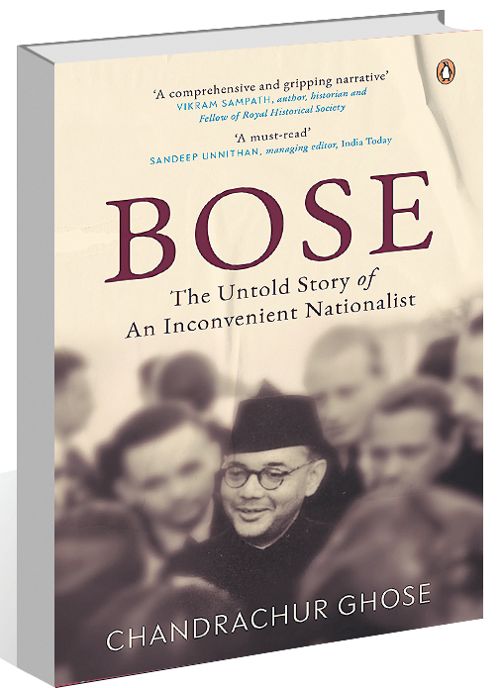
CHAPTER 9
The Phoenix Rises
On to Germany and Japan ( 1941-45)
‘Sj Subhas Bose Missing : Mysterious Disappearance From Home Detected on Sunday’ announced the headlines on page 5 of the Amrita Bazar Patrika, On Tuesday, 28 January, 1941 :
Under circumstances of great mystery and dramatic import Sj, Subhas Chandra Bose has disappeared from this Elgin Road residence, which according to the members of his house, was discovered on Sunday afternoon…. It is now gathered from the inmates of his house that for the last few days he had not been seeing anybody . Shut up in his room away from the view of anybody he had been performing religious practises … Later in the day the Special Brach Police searched the house of Sj Bose for three hours , the room occupied by Sj Bose being subjected to minute search ,
It was only over nine months later that the Government of India would officially inform the Council of State that Subhas Chandra Bose had ‘ gone over to the enemy’. When Yuveraj Dutta Sing asked on 10 November 1941 , whether the Government had any information on the whereabouts of Subhas, E Conran Smith, the home secretary replied :
It has been common talk in certain quarters in this country for some time that Sj Subhas Chandra Bose is either in Rome or in Berlin and has entered into a pact with the Axis powers to assist by fifth column methods any German invasion of India . Leaflets to this effect have made their appearance in this country and leave no doubt that he has gone over to the enemy.
Conran Smith informed the Council that the source of this information was ‘certain leaflets which have made appearance in this country’. He read out extracts from a couple of them. While one of them claimed, A pact has been signed at a conference in Berlin. The revolutionary Subhas Bose was also present’ , another read, ‘ He is now in a European country and is maintaining close contact with his revolutionary party in India . He has already issued a statement signed by his own hand. He is busy with certain foreign powers.
The secretary of state for India, Leopold S Amery , was more forthright, though not honest. On 27 November 1941, he repeated in the House of Commons the information provided to the Council of State adding , ‘I have no definite information’.
Unknown to everyone except very few in his family and few of his political associates, Subhas had left home on the night between 16 and 17, January, 1941, and travelled to Peshawar by train in the guise of a Muslim insurance agent. With the help of the members of the Kriti Kisan party and and member of the Forward Bloc working committee from the North- West Frontier Province ( NWFP) , Subhas then moved to Kabul and crossed over to Russian territory on 18 March > He travelled to Moscow with a passport issued by the Italian Legation In Kabul, under the assumed name Orlando Mazzotta, by car, and train. Leaving Moscow by train, Subhas reached Berlin on 2, April, 1941.
The preliminary impression of the German Foreign Office was that Subhas had gone to Germany for broadcasting propaganda. One of the persons to meet him after being welcomed by the high officials of the protocol department, therefore , was Hans Queling of the broadcasting department.
Without wasting any time , Subhas met Ernst Woermann, the director of the political department in the German Foreign Ministry , the very next day to discuss his plan. Having arrived only the previous day, Subhas could the main elements of his plan in brief :
.. he wants to set up and Indian government in Germany, visualising as a model the Polish, etc, … the governments in exile. To form his government, he expects certain promises from the Axis power, which he wants to formulate in detail. Besides propaganda actions the program furthermore includes the instigation of uprisings in India. As a final objective he has in mind the entry by the Axis powers into India, in regard to which he cited the following figures : The Anglo- Indian Army consisted of only 300,000 men, of which at most 70,000 were Englishmen. The major portion of the Indian elements was willing to defect at any time . An army of 100,000 men with modern equipment would be adequate to fee India from English rule.
Woermann, obviously was non- committal at this stage, suggested that once Subhas had put down his ideas in the form of a detailed document, he should be received by the Foreign Minister , Joachim von Ribbentrop.
Subhas submitted his first detailed plan on 9 April 1941, titled ‘ Plan for cooperation between the Axis power and India’ . He argued that despite facing numerous defeats, England had not relaxed its political and economic grip on India, and if it survived the war, its policy would be restore its power by exploiting India’s rich resources.
(Excerpted with permission from penguin Random House India)
[the_ad id=”55723″]


















